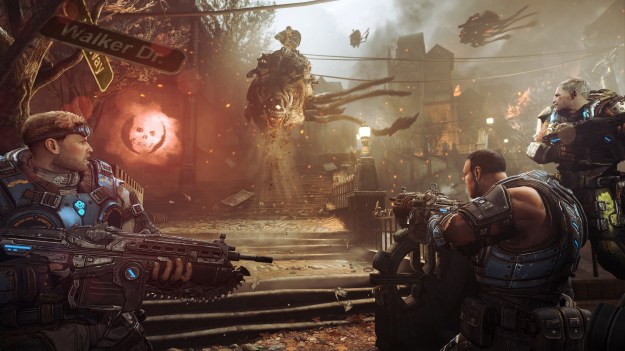
Gears of War: Judgment marked a lot of firsts for Epic’s 7-year-old franchise. It was the first game in the series made in part by an outside studio, the Polish dynamos People Can Fly. It was the first to be written by Rob Auten and Tom Bissell, taking over after Karen Traviss’ turn in Gears of War 3. It was also the first to not star the enormous, neckless Marcus Fenix. Long time fans of the series didn’t initially notice these differences, though; It was the game’s missing multiplayer modes like Horde whose absence loomed largest. Thankfully, intrepid tinkerers have found that at least one of the staple multiplayer modes from the Gears series is not gone, just hidden on the game disc. Playing it takes just a few button presses, like the easter eggs and secret codes of old.
Warzone is the essential multiplayer mode in the original Gears series: Teams of up to five players (only four in the original Gears of War) battle it out in a straight gunfight. It’s the type of death match standard in shooters going back to id’s Doom. Like Horde mode, though, Warzone wasn’t in Judgment’s multiplayer options but here’s how you can access it.
When heading into multiplayer, start a private match then select Team Death Match. At the confirmation prompt, press both A and B buttons at the same time. At the prompt to start the match, hit A again and the Warzone match will begin.
Epic apparently didn’t know Warzone was accessible in the game, though it did know it was in the code. “Thanks for the heads up,” senior multiplayer programmer Peter Knepley told a fan. “[It] was easier to leave Warzone refs than rip [them] out.”
From the Atari 2600 era all the way through to the Gamecube, PlayStation 2, and Xbox, it was common for game makers to leave hidden modes, cheats, and other surprises buried inside a game for players to discover. Famous ones like the Konami Code – originally used to give extra lives in games like Contra and Gradius on the NES – are still well known today.
A couple of factors weeded easter eggs like these out of games, though. First, hidden mini-games or other modes had to be disclosed to the ESRB in the wake of the Grand Theft Auto: San Andreas “Hot Coffee” scandal. Second and most significantly was the ubiquity of downloadable content. When the PlayStation 3 and Xbox 360 brought parity to PC games in terms of online connectivity, game makers started charging extra for this sort of additional content, rather than leaving it in as a bonus to discover later on. Why give away Warzone when you can charge for it later on? Whether it was accidental or not, Epic’s kept a good old tradition alive.


